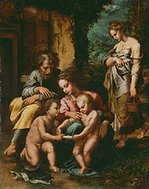 The Holy Family, Giulio Romano, ca. 1520-23, Getty Collection
The Holy Family, Giulio Romano, ca. 1520-23, Getty CollectionOur Lord's ultimate purpose in being born as one of us was not that He might be like us, but rather that we might become like Him—a far greater miracle, and a far greater incentive to rejoice in our present lowliness than the Modernist heresy which tries to make God adore man!
"THERE ARE two principal lessons which we are taught on the great Festival which we this day celebrate, lowliness and joy. This surely is a day, of all others, in which is set before us the heavenly excellence and the acceptableness in God's sight of that state which most men have, or may have, allotted to them, humble or private life, and cheerfulness in it. If we consult the writings of historians, philosophers and poets of this world, we shall be led to think great men happy; we shall be led to fix our minds and hearts upon high or conspicuous stations, strange adventures, powerful talents to cope with them, memorable struggles, and great destinies. We shall consider that the highest course of life is the mere pursuit, not the enjoyment, of good.
But when we think of this day's Festival, and what we commemorate upon it, a new and very different scene opens upon us. First, we are reminded that though this life must ever be a life of toil and effort, yet that, properly speaking, we have not to seek our highest good. It is found; it is brought near us, in the descent of the Son of God from His Father's bosom to this world. It is stored up among us on earth. No longer need men of ardent minds weary themselves in the pursuit of what they fancy may be chief goods; no longer have they to wander about and encounter peril in quest of that unknown blessedness to which their hearts naturally aspire, as they did in heathen times. The text speaks to them and to all, "Unto you," it says, "is born this day in the city of David a Savior, which is Christ the Lord."
John Henry Newman
Read it all here:
http://www.sspx.ca/Angelus/1983_December/Religious_Joy.htm

No comments:
Post a Comment